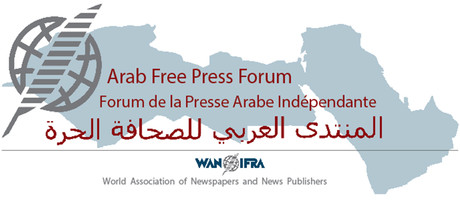Hussam Eddin Muhammed, columnist for Palestinian-owned, London-based paper Al-Quds al-Arabi, said that respecting the reader and the viewer is very important. There are both journalists who risk their lives to bring accurate news to the public, and then there are media that just offer incorrect news. Anette Novak, former editor-in-chief of Swedish daily Norran, believes that transparency is absolutely essential for credibility. This means giving the readers background information that you might not immediately think to give, and working with them in an open way. Clearly the journalists in the newsroom still have an important position, but if the crowd is working with the publication, it will both produce better journalism and more trust.
Lina Attalah, managing editor of Egypt Independent, the English-language arm of Al-Masry Al-Youm, explained that all staff of Al-Masry Al-Youm meet every 6 months to evaluate their performance as a publication. "We try to self-criticise," she said, "and to be aware of our problems and our bias." She commented that she sees this as a dynamic way to ensure than ethics are being respected.
How should an ethical code be implemented? Is it necessary to enshrine ethical guidelines in law?
"Laws are not enough, although they are a necessity," said Kamel Labidi, president of the Tunisian National Authority for Reform of Information and Communication (INRIC). Even under the old regime in Tunisia, there were press freedom laws, he pointed out, but that did not mean that the media operated freely.
As Magda Abu Fadil, director of the Journalism Training Program at the American University of Beirut, said, "a code of ethics should not come from the government but should be willingly established by the news organisations." Labidi agreed, saying that ethics codes should be an internal affair among journalists, and that nobody should exert pressure on them. They themselves should be determined to respect international professional and ethical standards.
Until recently, Labidi continued, Tunisians were not interested in Tunisian mass media and were following foreign media, but trust is slowly coming back. More training for journalists is necessary, however, he added, as there are still problems with editorial quality.
However, as audience participants noted, it is important to ensure that ethical codes are not used as an excuse to imprison journalists. Abu Fadil, who believes that there is a real need to modernize structures that support the press, said that in Lebanon there was a fear of the word 'code' as it sounded like something carved in stone, so "guidelines for good journalism" were established instead.
Novak gave the audience a message from Mehdi Garbi, an exiled Tunisian humans rights activist who just won the 2012 Martin Luther King award. He stressed the importance of focusing on readers and users and working with them and said that now, transparency is the only way to regain credibility.
To see photos of the conference, click here




